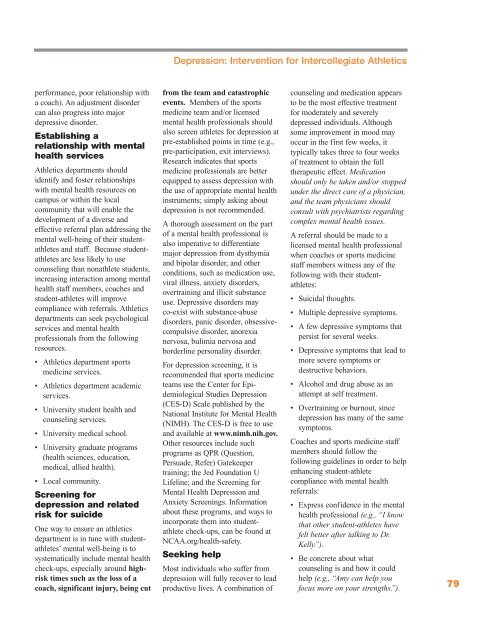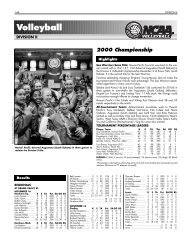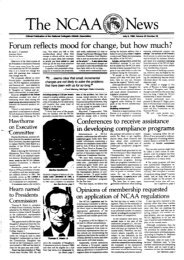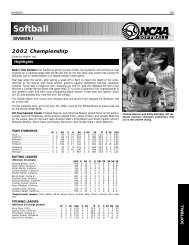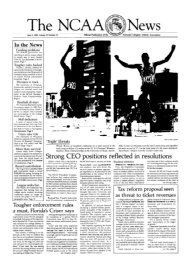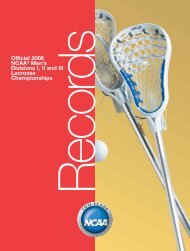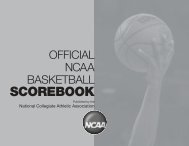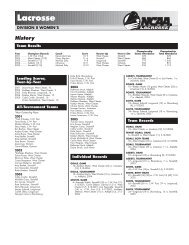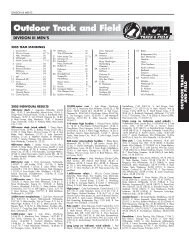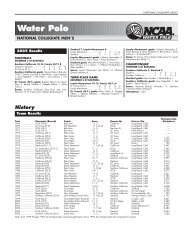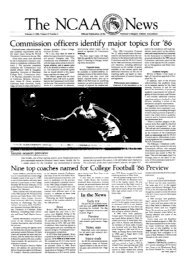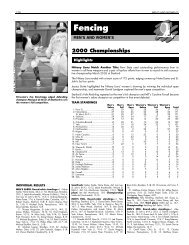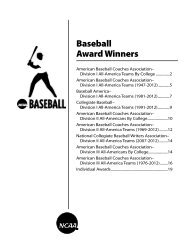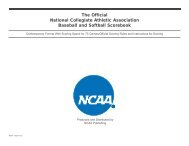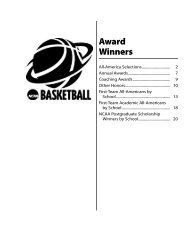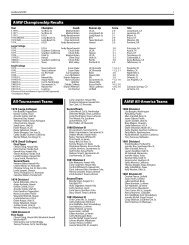Sports Medicine Handbook - NCAA
Sports Medicine Handbook - NCAA
Sports Medicine Handbook - NCAA
Create successful ePaper yourself
Turn your PDF publications into a flip-book with our unique Google optimized e-Paper software.
performance, poor relationship with<br />
a coach). An adjustment disorder<br />
can also progress into major<br />
depressive disorder.<br />
Establishing a<br />
relationship with mental<br />
health services<br />
Athletics departments should<br />
identify and foster relationships<br />
with mental health resources on<br />
campus or within the local<br />
community that will enable the<br />
development of a diverse and<br />
effective referral plan addressing the<br />
mental well-being of their studentathletes<br />
and staff. Because studentathletes<br />
are less likely to use<br />
counseling than nonathlete students,<br />
increasing in teraction among mental<br />
health staff members, coaches and<br />
student-athletes will improve<br />
compliance with referrals. Athletics<br />
departments can seek psychological<br />
services and mental health<br />
professionals from the following<br />
resources.<br />
• Athletics department sports<br />
medicine services.<br />
• Athletics department academic<br />
services.<br />
• University student health and<br />
counseling services.<br />
• University medical school.<br />
• University graduate programs<br />
(health sciences, education,<br />
medical, allied health).<br />
• Local community.<br />
Screening for<br />
depression and related<br />
risk for suicide<br />
One way to ensure an athletics<br />
department is in tune with studentathletes’<br />
mental well-being is to<br />
systematically include mental health<br />
check-ups, especially around highrisk<br />
times such as the loss of a<br />
coach, significant injury, being cut<br />
Depression: Intervention for Intercollegiate Athletics<br />
from the team and catastrophic<br />
events. Members of the sports<br />
medicine team and/or licensed<br />
mental health professionals should<br />
also screen athletes for depression at<br />
pre-established points in time (e.g.,<br />
pre-participation, exit interviews).<br />
Research indicates that sports<br />
medicine professionals are better<br />
equipped to assess depression with<br />
the use of appropriate mental health<br />
instruments; simply asking about<br />
depression is not recommended.<br />
A thorough assessment on the part<br />
of a mental health professional is<br />
also imperative to differentiate<br />
major depression from dysthymia<br />
and bipolar disorder, and other<br />
conditions, such as medication use,<br />
viral illness, anxiety disorders,<br />
overtraining and illicit substance<br />
use. Depressive disorders may<br />
co-exist with substance-abuse<br />
disorders, panic disorder, obsessivecompulsive<br />
disorder, anorexia<br />
nervosa, bulimia nervosa and<br />
borderline personality disorder.<br />
For depression screening, it is<br />
recommended that sports medicine<br />
teams use the Center for Epidemiological<br />
Studies Depres sion<br />
(CES-D) Scale published by the<br />
National Institute for Mental Health<br />
(NIMH). The CES-D is free to use<br />
and available at www.nimh.nih.gov.<br />
Other re sourc es include such<br />
programs as QPR (Question,<br />
Persuade, Refer) Gate keeper<br />
training; the Jed Found ation U<br />
Lifeline; and the Screening for<br />
Mental Health Depression and<br />
Anxiety Screenings. Information<br />
about these programs, and ways to<br />
incorporate them into studentathlete<br />
check-ups, can be found at<br />
<strong>NCAA</strong>.org/health-safety.<br />
Seeking help<br />
Most individuals who suffer from<br />
depression will fully recover to lead<br />
productive lives. A combination of<br />
counseling and medication appears<br />
to be the most effective treatment<br />
for moderately and severely<br />
de pressed individuals. Although<br />
some improvement in mood may<br />
occur in the first few weeks, it<br />
typically takes three to four weeks<br />
of treatment to obtain the full<br />
therapeutic effect. Medication<br />
should only be taken and/or stopped<br />
under the direct care of a physician,<br />
and the team physicians should<br />
consult with psychiatrists regarding<br />
complex mental health issues.<br />
A referral should be made to a<br />
licensed mental health professional<br />
when coaches or sports medicine<br />
staff members witness any of the<br />
following with their studentathletes:<br />
• Suicidal thoughts.<br />
• Multiple depressive symptoms.<br />
• A few depressive symptoms that<br />
persist for several weeks.<br />
• Depressive symptoms that lead to<br />
more severe symptoms or<br />
de structive behaviors.<br />
• Alcohol and drug abuse as an<br />
attempt at self treatment.<br />
• Overtraining or burnout, since<br />
depression has many of the same<br />
symptoms.<br />
Coaches and sports medicine staff<br />
members should follow the<br />
following guidelines in order to help<br />
enhancing student-athlete<br />
compliance with mental health<br />
referrals:<br />
• Express confidence in the mental<br />
health professional (e.g., “I know<br />
that other student-athletes have<br />
felt better after talking to Dr.<br />
Kelly.”).<br />
• Be concrete about what<br />
counseling is and how it could<br />
help (e.g., “Amy can help you<br />
focus more on your strengths.”).<br />
79


